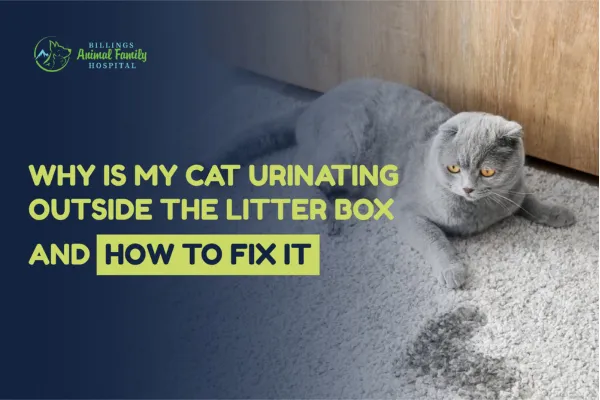
Why Is My Cat Urinating Outside The Litter Box | Billings Animal Family Hospital
Why Is My Cat Urinating Outside The Litter Box And How To Fix It
While walking past your spare room, you find several wet spots on the rug. The unmistakable scent is a dead giveaway of what caused it. Your cat is urinating outside the litter box yet again.
Why does my cat pee outside the litter box? You've asked yourself countless times. You love your cat, but you are frustrated and perplexed. What message are they trying to send?
Inappropriate elimination (i.e., urinating or defecating outside the litter box) can strain the strongest owner-cat relationship and add stress, confusion, and frustration. Understanding the reasons behind this behavior is the first step to correcting it and restoring a clean, stress-free, and loving environment for both you and your pet.
What You'll Find In This Post . . .
Why Is My Cat Urinating Outside The Litter Box And How To Fix It
Understanding why your cat is urinating outside the litter box
Medical reasons your cat might avoid the litter box
How stress and changes in the environment affect litter box use
How your cat's litter box preferences influence behavior
Negative associations that may cause cats to stop using the litter box
Steps to prevent your cat from peeing outside the box
1. Choose the right litter and box
Eliminate litter box problems with proper understanding and professional help

Understanding why your cat is urinating outside the litter box
Cats usually avoid the litter box for a reason, and it's rarely random. The behavior can indicate a medical problem, a behavioral issue, or an environmental concern. Paying attention to any changes in your cat's habits or health is the first step in addressing the problem.
Medical reasons your cat might avoid the litter box
Health issues are one of the leading reasons cats urinate outside the litter box. Common medical causes for inappropriate urination include:
Feline idiopathic cystitis
Urinary stones
Urinary tract infection
Thyroid disease
Diabetes mellitus
The pain from these conditions may make cats associate the litter box with a negative experience and avoid it altogether. Since these problems can worsen quickly, it's essential to consult a veterinary professional.
A complete physical exam will diagnose or rule out many conditions that can cause or worsen changes in litter box behavior. Diagnostics such as urinalysis, abdominal X-rays, or an ultrasound can help evaluate your cat’s bladder and kidneys.
How stress and changes in the environment affect litter box use
Cats are susceptible to their surroundings. A simple change in their environment can cause them stress. You may notice your cat is urinating outside the litter box during situations like:
Bringing home new pets
Loud noises
Moving furniture, or
Changes in routine can all trigger a cat to pee outside
Creating a calm environment, providing safe hiding spots, and maintaining a consistent routine can encourage your cat to return to everyday box habits.
Giving your cat extra attention and gentle reassurance during stressful periods can reduce anxiety. You can also use pheromone diffusers or calming sprays to help create a sense of security and comfort in your home.
How your cat's litter box preferences influence behavior
Sometimes your cat may avoid the litter box simply because it doesn't like the type of litter, box style, or location. Consider these factors:
Type of litter: Many cats prefer clumping litter.
Box style: Some cats do not like covered boxes.
Cleanliness: Dirty boxes discourage use.
Location: Boxes placed in noisy or high-traffic areas may be avoided.
Adjusting the litter type and box setup to your cat's preferences often resolves accidents. You can also place multiple boxes around the home to give your cat more options. Observing which setups your cat consistently uses will help you maintain a comfortable and stress-free environment.
Understand what your cat is telling you in this article: Feline Communication: How Cats Talk
Negative associations that may cause cats to stop using the litter box
Sometimes, cats avoid the litter box not because of the box itself, but because of negative experiences linked to it.
Painful experiences – If your cat experienced pain while eliminating, due to a urinary tract issue, constipation, or other discomfort. This experience may cause your cat to associate the litter box with pain and avoid it even after recovery.
Startling or frightening encounters – A cat that has been startled, ambushed by another pet, or punished near the litter box can develop fearful associations and begin avoiding the box as a self-protective behavior.
Stressful situations nearby – Loud noises, sudden movements, or frequent disruptions near the litter box can make cats feel unsafe, causing them to avoid the area altogether.
Negative associations can be powerful and long-lasting, but with patience and the proper adjustments, most cats can relearn to see the litter box as a safe, stress-free place.
Providing quiet locations, a calm environment, and positive reinforcement can help rebuild your cat's confidence. If the problem persists, don't hesitate to contact us for expert support.

Steps to prevent your cat from peeing outside the box
The good news is, with the proper techniques, you can stop asking yourself “Why does my cat pee outside the litter box?” and help your cat feel more comfortable at home. A little proactive care goes a long way in keeping your cat happy.
1. Choose the right litter and box
Cats can be particular about their bathroom setup. Try clumping or unscented litter, keep the box clean, and use an uncovered box if that’s what your cat uses and prefers.
2. Pick the perfect spot
Location matters. Place the litter box in a quiet, low-traffic area so your cat feels safe and relaxed while using it.
3. Keep a consistent routine
Cats thrive on predictability. Feeding, playtime, and cleaning on a regular schedule help reduce stress and encourage healthy habits.
4. Use positive reinforcement
Celebrate good litter box behavior with gentle praise or a small treat. Positive encouragement builds trust and helps prevent accidents.
5. Schedule a health check
If accidents continue, it may be a sign of an underlying health issue. A veterinary check can rule out conditions like urinary infections or arthritis that make the litter box difficult to use.

Eliminate litter box problems with proper understanding and professional help
Understanding why your cat urinates outside the litter box is essential to solving the issue. Medical problems, stress, and box preferences are common causes, but with careful observation and proper care, most cats can be guided back to adequate litter box habits.
If you need professional help, you can download our Emergency Vet Contact Card to have quick access to veterinary care whenever it's needed, or contact us today!




